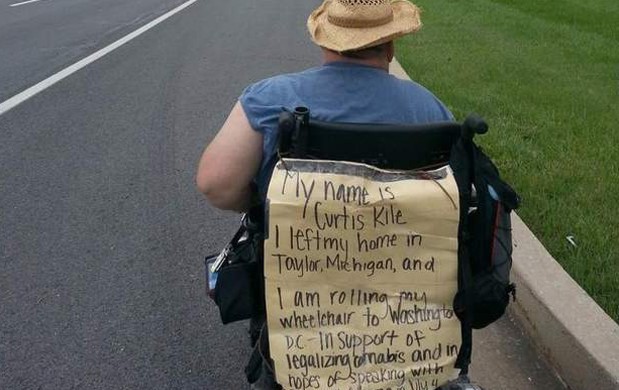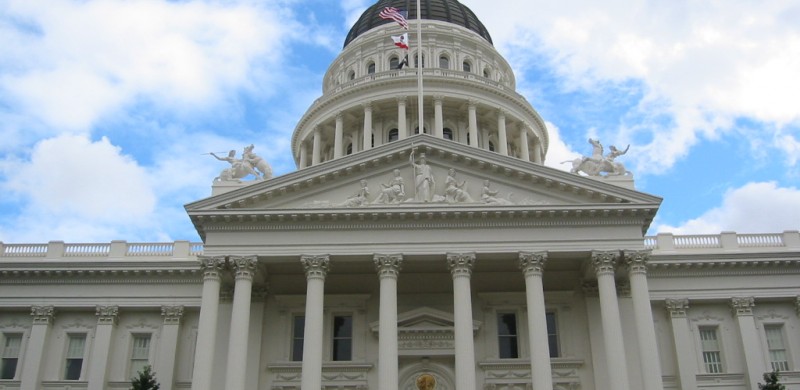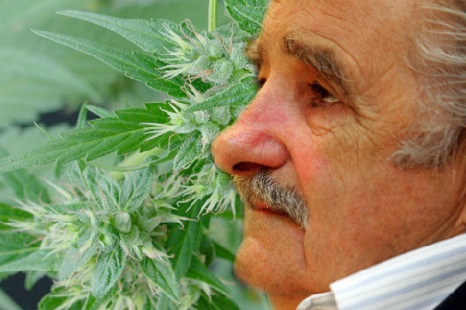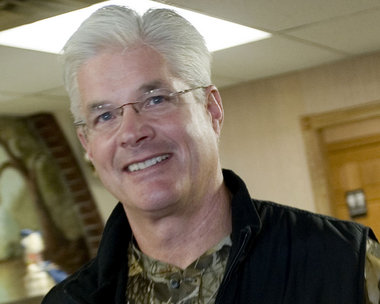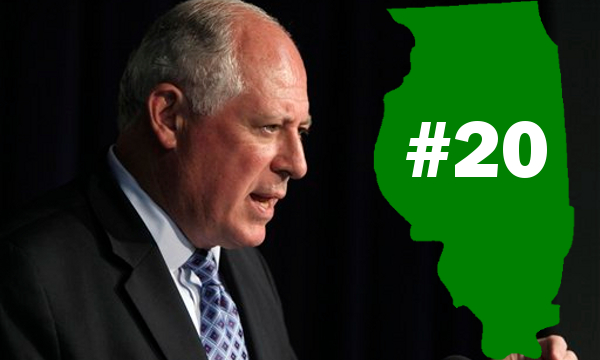
Nov 19, 2014 | Health Benefits of Marijuana, Legalization, Michigan Medical Marijuana Act
By Michael Komorn
In dramatic fashion, 52-year-old Curtis Kile, who is afflicted with cerebral palsy is rolling his wheelchair to the White House to advocate for medical marijuana users.
Kile departed his Taylor home June 14 and inched his way down sidewalks, through traffic, across mountains and through cities and small towns from Michigan to Washington.
He intends to tell President Obama, face-to-face, that marijuana should be legalized in the United States. He believes sick people should have safer and cheaper access to the drug that he believes has been critical to his health.
(Related: Arizona Supreme Court Sets Example for Michigan, Other Medical Marihuana States )
“The alcohol industry doesn’t want it legal, and the pharmaceutical and the tobacco companies don’t want that, because it’s going to bite into their profits.
“It’s the money that’s stopping it, and that’s wrong,” he said.
Whether Kile is ever granted an audience with the President or not, remains to be seen, but there is strong symbolism in his will.
(Related: 10 Police Raids Gone Wrong)
“His story has inspired people all across the country,” said Rick Thompson, Flint-based editor of the Compassion Chronicles, an online news source for the cannabis community in Michigan. Thompson wrote about Kile last week.
“I don’t know that he’ll get to speak to the president, but there’s no denying his passion,” added Southfield attorney Michael Komorn, host of Planet Green Trees, a weekly Internet interview show about marijuana.
(Related: What Did I Just Get Charged With?)
The man on a mission has long depended on marijuana to control the severe muscle spasms and other symptoms his condition. His sole desire is for sick Americans to have low-cost, legal access to the medicine they need.
Contact Michigan Medical Marijuana Attorney Michael Komorn at 800-656-3557 for a free case evaluation, today.
Read more: http://www.freep.com/article/20130701/NEWS02/307010012/Taylor-man-in-wheelchair-rolls-to-Washington-on-marijuana-crusade

Nov 18, 2014 | Legalization, Marijuana Criminal Defense Attorney Michael Komorn
https://www.youtube.com/watch?v=_idxcY2Uirs
In 2010, Michigan State Police returned the medical marijuana they seized from our client during a traffic stop. The cannabis was returned after we obtained a dismissal of all charges in a court order directing the arresting agency to return the medical marijuana to our client.

Nov 18, 2014 | Legalization
On Dec.10, 2010, on a statewide ballot, California voters narrowly struck down the Regulate Control and Tax Cannabis Act. If passed, Prop 19 would have allowed marijuana to have been bought, sold and taxed like alcohol or tobacco. The proposition got more votes than the republican gubernatorial candidate that year and ultimately failed due to a massive lobbying and propaganda campaign which confused and misled voters and lawmakers alike. With more than 47% of respondents in California saying they had smoked marijuana at least once in the past year and 50% saying they were in favor of decriminalization (in 2010), one may rightly wonder how such a proposal failed to pass. Following the massive amounts of money put behind the campaign to squash Prop 19 offers insight into the interests fueling and propagating our nation’s ravenous war on drugs.
Police Association Lobbyist John Lovell is one of the people behind the campaign squash Proposition 19. Lovell has been paid hundreds of thousands of dollars by the Police Association Lobby to strategically propagate and disseminate misinformation about the relative risks and medical benefits of cannabis. As I discussed in a previous post, Obama’s stimulus plan has incentivized police departments across the nation with federal grant money to militarize their units and increase the number of drug busts. Getting the money out of your pocket and into police coffers can be done in two ways: The police can come to your house, steal everything of value, and make you pay to get it back under current forfeiture laws; or they can get money through grants by “creating” programs and fluffing up their stats with petty possession busts. When the Stimulus Plan passed, an email was sent to dozens of police departments highlighting the opportunity for more funding, providing Lovell’s direct line if they had more questions. Soon after, programs such as the “Marijuana Suppression Program,” and the “Campaign Against Marijuana Planting,” sprang up. The former garnered some $2.2 million in federal grants, while CAMP drew almost $7.6 million. Most of this money went directly into the paychecks of police officers. When the “North California Eradication Team” was formed, $550,000 in federal grants were directed toward three police departments that spent the money on the costs associated with overtime, hiring a new officer, and flight operations. Though legalizing the drug would have generated billions of dollars in revenue for the State, the benefits of millions of Californians paled in comparison to the hundreds of thousands of dollars that Lovell’s firm would collect in fees after securing tax dollars for police.
But it’s not just police who would lose big bucks if marijuana were decriminalized; the beer industry, Alcohol corporations, and prison guard interests all contributed to Lovell’s campaign to stop Proposition 19. Drug Companies, too, would hate to see marijuana legalized, as they see it as a low-cost alternative to the dangerous opiates they sling from sea to sea. With over 50% of Americans now in favor of legalization, I am confident that the will of the people will prevail over the power of a very rich few.

Nov 18, 2014 | Legalization
This week, the lower house of representatives in Uruguay passed a bill that would legalize marijuana for all residents. The proposal would see the state purchasing marijuana from licensed growers and allows individuals to grow 6 plants for personal use. Uruguay’s decision comes after decades of failed drug policy as the country is in the middle of the route for massive trafficking. But it’s not only Uruguay who is looking to change its policy toward the drug; Mexico President Enrique Peña Nieto has called upon the entire hemisphere to re-examine its stance toward drug prohibition. It is well understood that the demand for drugs in the U.S. has allowed for violent drug cartels to gain immense wealth and even enact some de facto law in regions throughout Central and South America. In Mexico alone, nearly 50,000 people died due to drug related violence between 2006 and 2011. If marijuana is legalized, the thinking goes, then at least some of the money that has been going into the hands of drug traffickers will now go to the State. Uruguay, with a population of around 3 million, is the perfect testing ground for legalization, and as the greater region leans toward this stance, it will be interesting to see how Obama and future Administrations react.

Nov 18, 2014 | Legalization, Michigan Medical Marijuana Act
On Aug. 14, citizens, prosecutors, and law enforcement officers will all descend upon the Grass Lake Township hall to discuss the pros and cons of decriminalizing marijuana in Michigan. State Republican Mike Shirkey has scheduled the town hall meeting in hopes of furthering the discussion of the medical benefits and societal risks of marijuana use as well as gaining support for HB 4623 which would decriminalize marijuana use for adults.
“Are we forcing law enforcement to police and jail recreational marijuana users instead of using time and money that should be going to battle our meth lab epidemic?” Shirkey, R-Clark Lake, said in a statement. “Are we limiting reasonable options to end-of-life pain management by putting excessive restrictions on medicinal marijuana?”
Joining the discussion will be Dem. Jeff Irwin, author of HB 4623 as well as members of Law Enforcement Against Prohibition (LEAP). Shirkey expects a good turnout, especially in light of the recently submitted petition to decriminalize marijuana in Jackson.
The town hall will be held at 5 to 7 p.m. Wednesday, Aug. 14, at the Grass Lake Township Hall, 373 Lakeside Drive.

Nov 18, 2014 | Legalization, Michigan Medical Marijuana Act
On Thursday, August 1, 2013, Illinois became the 20th state to enact Medical Marijuana Legislation. The law goes into effect on January 1st, but until then the House and Senate will have an opportunity to pick through the already restrictive bill, which will expire after 4 years and will need to be re-voted upon. Under its current format, the law would permit patients to possess up to 2.5 ounces every two weeks. Unlike in Michigan, Illinois’ bill specifically addresses the issue of dispensaries, permitting 22 grow operations that will supply the 60 dispensaries permitted to distribute the final product.
(RELATED: People V Green)
In order to become a patient, one must already have and existing doctor-patient relationship unless the individual is a veteran. Veteran’s will be exempt from this clause due to the Veteran’s Affairs’ strict anti-cannabis stance, and a loop-hole in the law provides vets an opportunity to get a prescription from someone other than their primary caregiver. Additionally, the profits attained by growers and dispensaries will be subject to a “privilege tax,” and all sales made by caregivers and dispensaries will be taxed at 7%. Patients will be taxed 1% for each purchase, which is similar to the tax on other pharmaceuticals.
(RELATED: People V McQueen)
Another important factor in Illinois’ Marijuana law is that there are no restrictions on driving. Hundreds of patients in Michigan have found themselves in court due to Michigan’s strict “Zero Tolerance” stance toward driving with any amount of a controlled substance in your system. We will follow this story closely and bring you updates as it continues to unfold.
